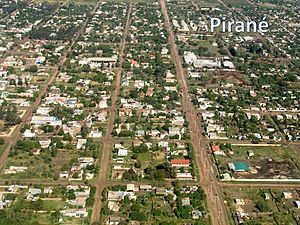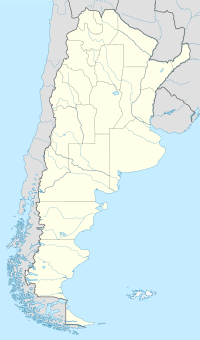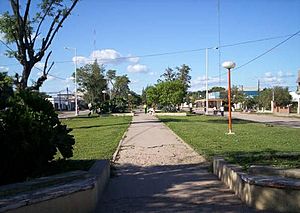Pirané facts for kids
Quick facts for kids
Pirané
|
|
|---|---|
 |
|
| Country | |
| Province | Formosa Province |
| Department | Pirané |
| Founded | November 21, 1912 |
| Area | |
| • Total | 30 sq mi (80 km2) |
| Elevation | 269 ft (82 m) |
| Population
(2010)
|
|
| • Total | 64,556 |
| • Density | 2,090/sq mi (810/km2) |
| Time zone | UTC−3 (ART) |
| Postal code |
3606
|
| Area code(s) | 03717 |
| Climate | Cfa |
| Website | pirane.gov.ar |
Pirané is a town in northern Argentina. It is located in Formosa Province.
Contents
About Pirané
Pirané is a town built on land near many lagoons. The Toba people, who lived here before, called this area "Puganagay," which means "green fields." The town started to grow when the Central Northern Rail line arrived in 1910. The train station opened in 1912, and this date is considered the founding of Pirané.
How Pirané Got Its Name
At first, the train station was called Estación km. 595. This name showed its distance from the start of the rail line in Embarcación (Salta). In 1915, the village became the main town for a new county. In 1919, it was renamed "Pira - ne."
The name "Pira - ne" comes from the Guarani language. It means "stinky fish." This name came about because during a very dry time, the lagoons dried up, and many fish died, causing a bad smell. In 1926, the director of the local school, Edmundo Strien, officially named the village "Pirané." This change became official the next year.
Location and Environment
Pirané is located in the Gran Chaco region, near the Bermejo River to the south. This area has dense, thorny dry forests. Summers can be very hot and challenging. Sometimes there are long periods without rain (droughts), and other times there are very heavy rains. The sandy soil here can easily wash away.
However, the forests around Pirané are rich in valuable trees like quebracho, pau d'arco, and astronium trees. Because of these trees, Pirané became an important center for forestry, which means cutting down trees for wood.
Wildlife in Pirané
The areas around Pirané have many wetlands. These wetlands are home to a wide variety of animals. You can find creatures like armadillos, herons, iguanas, jabirus, jaguars, magpies, coral snakes, storks, tapirs, toucans, and yacaré (a type of caiman).
Local Economy and Culture
Pirané is known in Formosa Province as the "Provincial Capital of Folklore." This means it's a special place for traditional music, dances, and stories. The town also has industries that work with lumber (wood), make furniture, and process food.
Pirané is about 109 kilometers (68 miles) west of Formosa, which is the capital city of the province. The two towns are connected by National Route 81.
See also
 In Spanish: Pirané para niños
In Spanish: Pirané para niños
 | DeHart Hubbard |
 | Wilma Rudolph |
 | Jesse Owens |
 | Jackie Joyner-Kersee |
 | Major Taylor |



